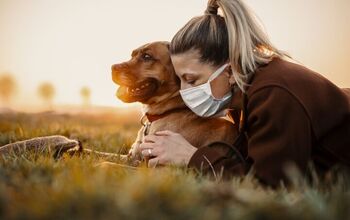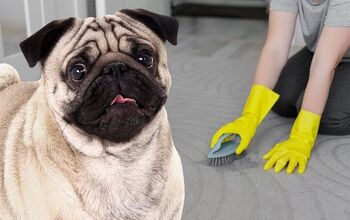4 Fabulous Benefits Of Olive Oil For Dogs

When it comes to natural remedies for dogs, there are a variety of “people foods” that can provide some valuable benefits. It’s a growing trend amongst owners who are making a push to provide more natural foods for their pups. Just one of these many options is olive oil – a wonderful source of monounsaturated fatty acids (which are considered a healthy fat). We know that it’s great for humans, that’s just a fact. The question now is: what can olive oil do for dogs? Good news! You’ve come to the right place for answers. So keep your eyes glued to this page and scroll away to learn four fabulous benefits of feeding olive oil to dogs.
Related: Can Dogs Eat Cinnamon?
Olive Oil Helps Create A Healthy Coat For Your Dog
When your dog has dry skin, it can be difficult to treat the condition. Even worse, it can be quite an expensive problem to deal with. Thankfully, if your dog has dry and flaky skin, you don’t necessarily need to shell out a small fortune to pay for fancy shampoos and conditioners that will set things right. The solution may be as simple as adding some olive oil to your dog’s diet. Olive oil is rich in antioxidants including vitamin E, and it is a good source of phytonutrients as well. When added to your dog’s diet, olive oil can help to repair dry and flaky skin in as little as three days (that’s right, three days!). The omega-3 fatty acids in olive oil help to moisturize your dog’s skin and, if you keep giving it to your dog, it can prevent the flaky skin from returning. It’s simple to administer as well. All you have to do is add about ½ tablespoon of olive oil to your dog’s food twice a day for several days. Once your dog’s skin improves you can reduce the amount to a few drops a day to keep his skin moisturized. Olive oil is a simple, inexpensive, and healthy solution to any dog’s dry skin problem that far too few owners take advantage of.
In addition to moisturizing your dog’s skin and coat, olive oil can also be even beneficial for his immune system. That’s right, this natural oil can actually improve how your pooch’s entire immune system functions. How? Well, olive oil is rich in polyphenols and carotenoids which help to improve immune system health. With a strong immune system, your dog will be better able to fight off infection if it is exposed to harmful pathogens. Having a healthy immune system is also important way to help your dog to transition from one season to the next. Just like people, dogs can get sick when the weather changes so adding a little olive oil to your dog’s food can help boost his immune system to prepare him for the change. This is a simple preventive measure to keep you pup healthy that far too few humans take advantage of.
Related: Top 10 Spices And Herbs That Are Safe For Dogs
Olive Oil Is Good For Your Dog’s Brain Health
You’ve already learned that olive oil is rich in antioxidants, but you may not realize just how important antioxidants are for your dog’s health. This isn’t just something that can help improve your dog’s body, olive oil can also improve that pup’s mind as well. A number of animal research studies have confirmed a link between olive oil and brain health. In one study oleocanthal, a type of polyphenol found in olives (and extra-virgin olive oil), was linked to a reduced risk for Alzheimer’s disease. Several human studies have linked Mediterranean-style diets that are rich in olive oil to lowered risk for dementia. Given the results of these studies, it would seem that adding olive oil to your dog’s diet can help to protect his brain from cognitive decline. This is especially important for senior dogs and for extra intelligent breeds like Poodles and Border Collies. So, if you have a dog that falls into those categories (or if you simply want your pup’s brain to be operating at full power), then it’s yet another reason to consider adding olive oil to your dog’s diet.
Olive Oil Helps Improve Your Dog’s General Health
In addition to providing specific benefits for your dog’s brain and immune system, olive oil can help to increase his overall health as well. Olive oil contains healthy monounsaturated fats which can reduce your dog’s risk for heart disease and diabetes. It’s also rich in oleic acid, a compound that has been shown to reduce the risk for cancer. It’s quite amazing what a massive impact a little bit of olive oil can make on your dog’s health. This oil plays such an important role on your pup’s health that it’s almost magical. There are absolutely no downsides, it’s nothing but a win
Ready To Add Olive Oil To Your Dog’s Diet? Great. Here Are A Few Tips To Make The Process As Simple As Possible
So you’ve finally done it. You’ve decided that it’s time to add a little olive oil to your dog’s diet. Congratulations. You’re about to make a major impact on your dog’s health and you will notice the benefits almost immediately. However, it’s important to take this seriously and do it right. So, if you have considered the benefits of olive oil for dogs and you are ready to add it to your dog’s diet, then there are a few things that you should consider first in order to do it right. Of course, if you are going to add anything new to your pet’s diet, it is a great idea to consult with your veterinarian to be sure that it will be appropriate and safe for your canine companion. Your vet can also help you with dosing for your particular pooch’s needs. It’s always important to defer to a vet before making any major changes to your pup’s diet. After all, every dog is different and not all health tips that you read online will apply to your dog. Only your vet is qualified to make that call. So always defer to a vet’s expertise. That said, if you’d like some general tips and guidelines about adding olive oil to your pup’s diet, check out the information below.
- Always stick with extra virgin olive oil. This type of olive oil will feature a fresher flavor, thanks to its reduced acid content. However, it could end up going rancid more quickly, so make sure store it in a dark bottle in an area of your kitchen that is away from heat. But, really, if you’re using it in your own healthy meals, then you likely don’t need to worry about it going rancid before you’ve finished the bottle. You’ll be burning through that olive oil quickly anyways.
- You can add olive oil to your dog’s food, whether he is eating kibble or canned food. Talk to your veterinarian about whether you should be adding olive oil to every meal or if you should only be adding it in during certain meal times. This is a tricky balancing act that’s worth discussing with your vet to achieve the best results.
- As a general rule, it isn’t a good idea to feed any more than just a teaspoon of extra virgin olive oil to your dog for every 20 pounds of the pup’s body weight. You can always mix the oil into your dog’s regular food. But, again, consulting with your vet is really the best way to go when you are trying to figure out the right dose for any supplement to your pet’s diet.
- When adding olive oil to your dog’s food, consider the fact that it contains fat and calories. For dogs that are prone to developing pancreatitis, the extra fat may increase their risk of having a flare-up. And for dogs that are prone to gaining weight, the calories and fat might make it easier for them to pack on the unwanted pounds. Once again, it can’t be stressed enough that consulting with your vet first, before you add olive oil to your pet’s diet, is key. While olive oil generally makes a positive impact on any dog’s life, there are exceptions to the rule. That’s where your vet comes in. Always defer to their expertise to keep your dog happy and healthy.
- As with anything else, you should be aware that there is always the risk that your dog’s body won’t react well to any olive oil that you add to his food. Every dog is a unique individual, after all. When it comes to olive oil, it’s worth noting that it might irritate the gastrointestinal tract of some dogs, particularly if they tend to have a sensitive stomach. If, after you give your dog some olive oil with his food, you notice that he has an upset stomach, it’s probably best to not give him anymore. And if your dog is vomiting or has diarrhea, don’t give your dog any olive oil, as doing so might make the situation worse. In general, it’s always wise to cease feeding your when his tummy is upset. This is especially true when it comes to olive oil as it may make the situation worse.
Who knew that this pantry staple could do so much good for your furry BFF? Do you use olive oil in your dog’s diet? What changes have you noticed? Leave your comments down below.

Kate Barrington is the loving owner of two cats (Bagel and Munchkin) and a noisy herd of guinea pigs. Having grown up with golden retrievers, Kate has a great deal of experience with dogs but labels herself a lover of all pets. Having received a Bachelor's degree in English, Kate has combined her love for pets and her passion for writing to create her own freelance writing business, specializing in the pet niche.
More by Kate Barrington























